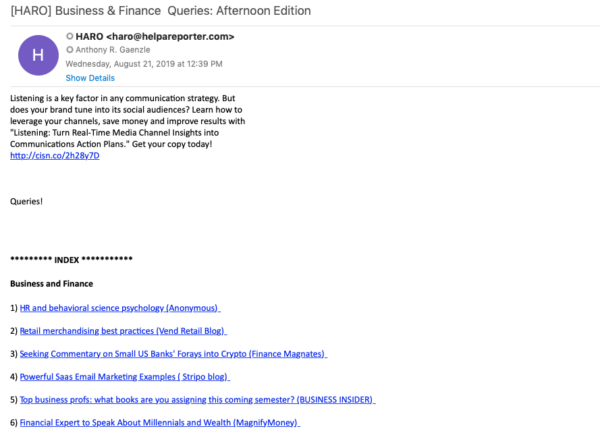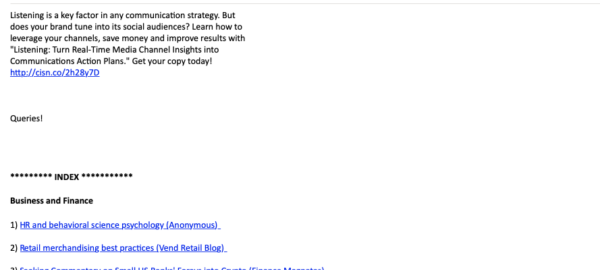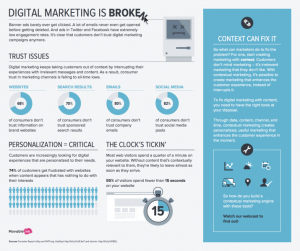— August 23, 2019
While links are by no means the only factor search engines use in determining where your site appears in search, without them, you really don’t stand much of a chance. Many SEO experts will tell you that links are arguably the most important factor in helping your site appear favorably in SERPS. In fact, Google has confirmed this school of thought. High-quality links coming into your site send search engines a signal that helps determine how authoritative and relevant the content on your site is to searchers. Well-optimized sites with lots of these types of links typically appear higher in search, thus receiving more traffic over time than their less-optimized counterparts. Link building isn’t an easy process, but it’s well worth the effort. To make such an effort a little easier, I’ve laid out a few high-level tips to help you get started with your link building strategy.
Build relationships
Contrary to an oft-cited 2014 statement made by Matt Cutts, former head of Google’s web spam team, guest blogging is still ok. The key is not to do it in a spammy way and to build reciprocal relationships with owners of high-quality websites that publish content that’s relevant to the content on your own site. Create relationships where you and your team exchange SEO-optimized content that adds value to the other website’s audience.
Your focus should be on thought leadership and reaching a new audience to gain awareness. Then work in keywords organically and in a non-spammy way to avoid having a negative impact. Drop in just one or two links back to content on your own site that add depth to the article. Avoid posting too frequently on any one website. To make this happen, the key is to build multiple relationships so you can stagger your guest posting and gain quality links back from a variety of domains. Reciprocal relationships are highly beneficial in all aspects of marketing. This is certainly true with link building and can be hugely valuable, if you follow the right path. Being spammy or posting too often on one site can have an opposite, negative impact.
Make the ask for backlinks
The idea here is to find relevant articles on high-quality domains and ask the site owners for a link back to a relevant article on your own site. For example. I write a lot about content marketing on my blog. Let’s say there is a particular article I really like, and I want to gain some traction. I would do some digging around the web and find relevant articles with anchor text that would make a great link back to my site while also adding depth and value for the other site’s readers. I would want to look at sites like the Content Marketing Institute or Convince and Convert for starters. After pinpointing a few articles that fit the bill, I would reach out to the editorial team and explain just where I think the link would fit, as well as why and the value it adds for readers.
This doesn’t always work, but when it does, you can very easily grab a link back to your site without having to do too much work. As long as the content on the site where you’re making the ask is relevant to the content on your site, this can be hugely beneficial. Getting links from high-quality sites in this manner can take time, so a great place to start is to work with colleagues, relatives, friends and co-workers who have relevant websites. They are often going to be more receptive to dropping a link on their site to help you out. As you start to build your site and gain backlinks, it will become easier to make the ask and get a ‘yes’ from the owners of higher quality sites.
Post on social media
Social media is a great way to promote your content. It can help your content connect with new audiences and generally expand the reach. A side benefit of sharing on social media is it helps other bloggers or website owners find relevant content that might make a great link within one of their upcoming articles.
Here’s an example of a simple Twitter post I created to a previous article I wrote for Business2Community.com:
These five websites can help boost your business and career potential #business #marketing @B2Community https://t.co/HxXqMHS6EL pic.twitter.com/8zLVzOyspk
— Anthony Gaenzle, MBA (@AnthonyGaenzle) August 19, 2019
I can then track who engages with the post, and if it makes sense I can reach out and open up a conversation about backlinks. If you notice a particular follower or connection on one of your social media channels regularly shares your content or mentions you, consider reaching out to build a relationship. Check to see if they have a website of their own. If the follower doesn’t have their own site, their company likely does. Once you’ve determined their situation, make the ask about whether they’d be willing to drop a link into one of their posts or even accept a guest post. If they are sharing your content on a regular basis, your chances of getting a positive response are much higher than if you are cold-emailing site owners.
Connect with writers seeking sources
Bloggers and more traditional media writers (aka ‘reporters’) are always looking for sources to help inform their stories. Connecting with these types of people is a great way to gain a link back to your site in exchange for a quote or a quick interview that bolsters their article with the voice of an expert. One of my favorite resources for this is HARO, which stands for Help A Reporter Out. I’ve personally been quoted and gained links from major publications like Forbes and Social Media Today by using this resource. To get started, simply go to the HARO website and click on “I’m a source.” You can sign up for either a free or paid subscription. I use the free version. HARO will then allow you to select the areas where you are an expert, and then you’ll receive emails tailored to your areas of expertise with requests for sources from a variety of writers and journalists.

Example of an email sent via HARO with opportunities to submit a pitch for media inquiries
You just browse through the topics, and if you feel there’s an inquiry where you can add some value, you submit a pitch. Sometimes they get accepted, and sometimes they don’t. It’s really a numbers game, but if you put some effort into your pitch, and you have the right expertise, you’re bound to grab a high-quality link here and there.
Getting started
The important thing to understand is that you shouldn’t just start sending out random emails or writing unsolicited guest posts. As with any marketing initiative, you should have a strategy built around your link building efforts. Determine things like which sites you want to target, what keywords you want to rank for and who will be in charge of the different aspects of your strategy. What social media channels will you be utilizing, and how does your link building strategy play into your approach to each of those channels? Once you’ve ironed out the details, document your strategy so you can hold yourself to it. Jot down some metrics to track your performance and have deadlines to ensure you stay on top of necessary tasks. Having a strategy in place will almost always result in higher levels of success. So, follow along with the article, but be sure to get it all in writing before you kick things off.
Digital & Social Articles on Business 2 Community
(76)
Report Post





